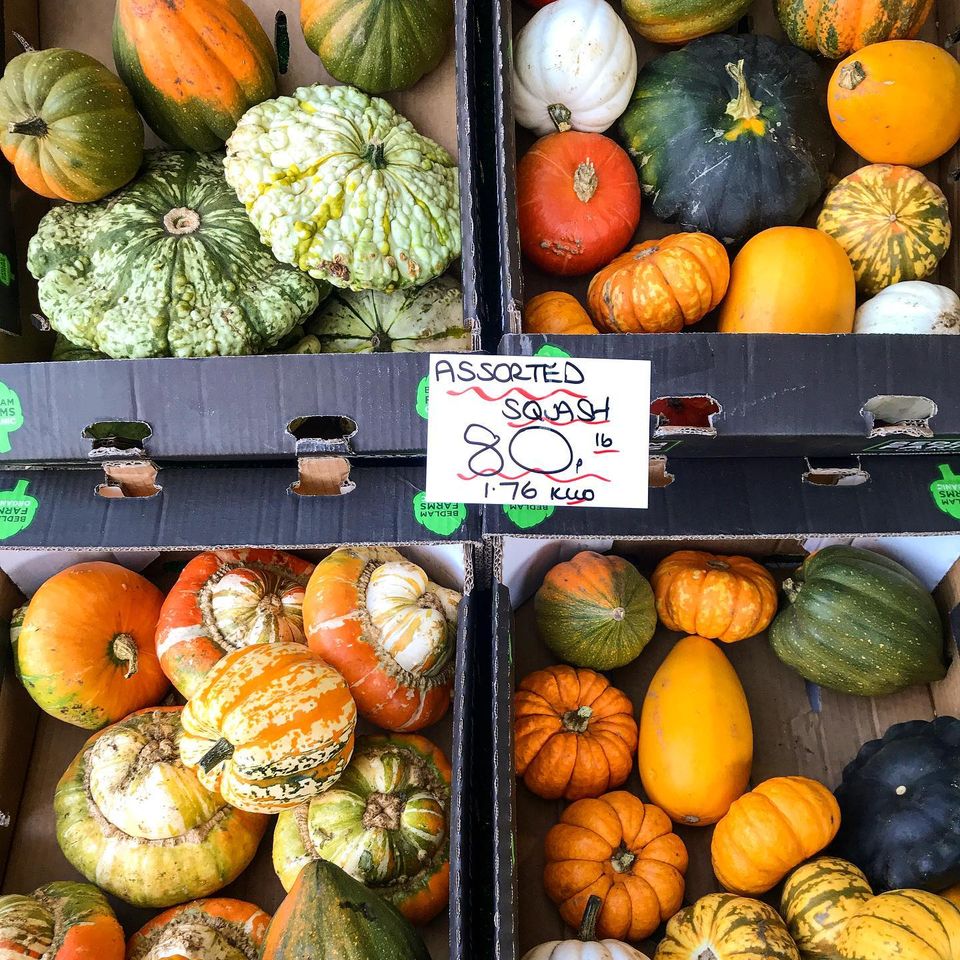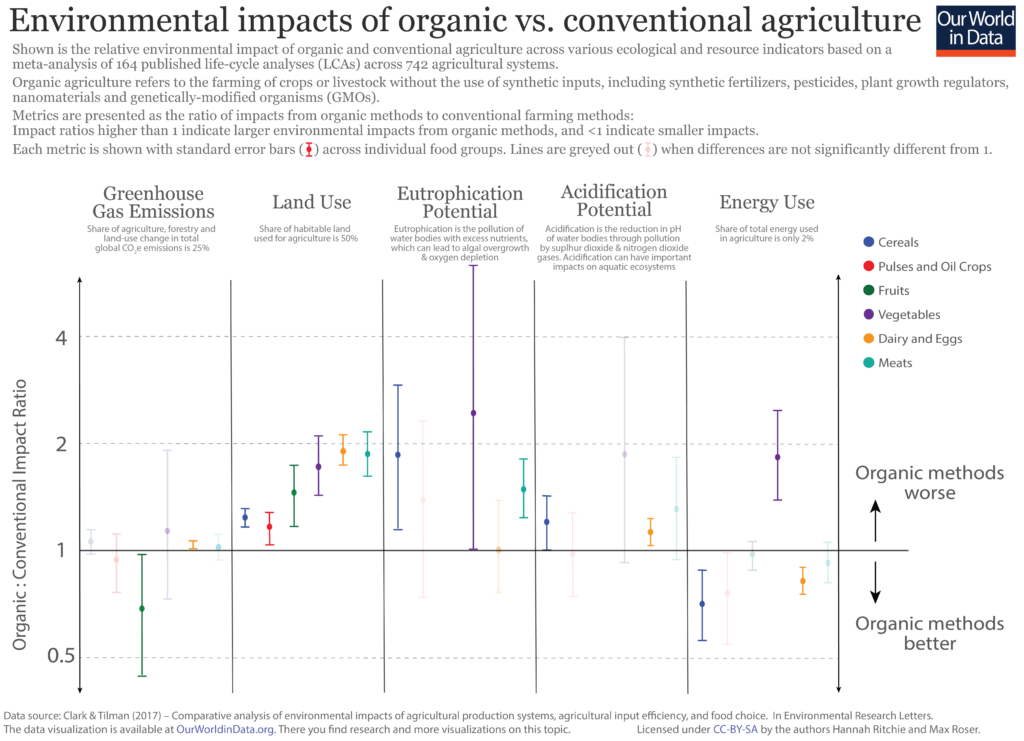 Each week I visit the grocery store and load up my cart with a variety of different vegetables. I mostly purchase regularly grown veggies and skip straight past the overly expensive organic section. Recently, I listened to a podcast that explored whether buying organic vegetables was really worth it and it got me questioning my own spending habits. Is organic veg really as good as they say? What’s the most ethical choice for environmentally conscious vegans? Well, let’s find out.
Each week I visit the grocery store and load up my cart with a variety of different vegetables. I mostly purchase regularly grown veggies and skip straight past the overly expensive organic section. Recently, I listened to a podcast that explored whether buying organic vegetables was really worth it and it got me questioning my own spending habits. Is organic veg really as good as they say? What’s the most ethical choice for environmentally conscious vegans? Well, let’s find out.
Before we get started, let’s first clarify the difference between organic and regularly grown veggies.
What are organic vegetables?
Organic vegetables are grown without the use of artificial chemicals. If farmers wish to grow organic produce, they must comply with set standards that impact their methods and resources. Organic farmers often practice methods of farming that promote biodiversity, conservation, and ecological balance.
How are regularly grown vegetables different from organic?
Non-organic vegetables are often grown with the assistance of pesticides. The use of pesticides guarantees a more successful season of crops for many farmers. This is because chemicals sprayed over crops often combat unwanted insects and the growth of fungi and weeds.
Organic Veg Vs Regular Veg
There are a few factors to consider when it comes to comparing organically grown vegetables to regularly grown vegetables. These include impacts on our health, the environment, as well as our bank balances.
Cost
It’s no secret that conventionally grown fruit and vegetables are sold at a lower price than organically grown crops. Organic food comes at a higher price for many reasons. The first is that without pesticides, more manual labour is needed to keep the crops healthy. Fertilizers that don’t contain artificial chemicals are more expensive and farmers have to rotate their crops more often to keep the soil healthy. There is also the fact that acquiring organic certification isn’t cheap.
Understanding and knowing the reasons behind pricey organic veg may not be enough to sway you over to that aisle, but is it worth the extra dollar if your health is at stake?
Health and Nutrition
One of the main reasons members of the public lean towards organic vegetables over conventionally grown vegetables are the benefits to our overall health. Andrea Paul, MD, the Medical Advisor to Illuminate Labs, shared her thoughts on why organic produce isn’t significantly healthier than conventional produce.
However, a major study in 2014 by researchers of Newcastle University found that organic crops had 18-69% higher concentrations of antioxidants. Antioxidants are substances that protect cells in the body from radical damage. The researchers concluded that consumers who choose to switch to fresh organic produce would get 20-40% more antioxidants. This is the equivalent of around two extra portions of fruit and vegetables per day!
A more recent 2017 study reviewing Human health implications of organic food and organic agriculture concluded that organic food consumption may reduce the risk of allergies and obesity. The study found that the result could be impacted by how consumers of organic food tend to have healthier lifestyles overall. It also concluded that organic food production has several potential health benefits for humans, and wider use of organic production methods in conventional agriculture could benefit human health.
But here’s the thing: while these studies examine the health of consumers, they are overlooking the health of the farm workers, who are exposed to pesticides at a far greater level than the general public. Pesticides pose greater risks of birth defects, cancer, learning disabilities, and neurological conditions to farm workers.
Environment
So if evidence suggests organic vegetables may be better for our health and nutrition, what about the impact of growing organically on the environment? In 2017, Our World in Data, a scientific publication based in the University of Oxford that studies macro issues, researched whether organic methods of growing were really better for the environment over conventional agriculture. They stated that “despite the strong public perception of organic agriculture producing better environmental outcomes, we conclude that conventional agriculture often performs better on environmental measures including land use, greenhouse gas emissions, and pollution of water bodies.” In layman’s terms, this means more resources (such as land) are required to produce the same amount of foods when using organic methods, versus conventional methods. (This is also why, as we know, “grass-fed” and “free-range” meats are not sustainable, but in fact emit roughly twice as much greenhouse gases as factory farming—which is why the idea of sustainable meat is a myth.)
But once you break down this analysis by food groups, you can see what sort of impact you are incurring.
Interestingly, it’s clear that for all fruits and almost half the veggies, organic is better for reducing GHG emissions. Organic grains, fruits, and pulses also score better in terms of energy use—while conventional vegetables use less energy. Eutrophication potential (potential to pollute water bodies) is much lower for conventional vegetables. It appears that for vegans, organic fruits and conventional vegetables might be the most eco-friendly choice to make.
It’s also interesting to note that a 20-year study by the U.S. Geological Survey (hardly the most progressive organization) found that over half a billion pounds of pesticides used in the country is wreaking havoc on aquatic life. This, of course, appears to contradict the finding by World In Data.
Conclusion
It’s hard to decipher which is better, organic and conventionally grown veg. Do you spend more money to improve your health and nutrition intake or do you spend less, use less land, but risk ingesting pesticides and impacting farm workers’ health? It’s always tough to make the right choices when you don’t exactly know where you’re food is coming from.
Personally, despite the studies and research, I think the main takeaway is to make an effort to shop more locally, visit farmers’ markets, and do more research about where exactly our vegetables are coming from. We want to be able to shop within our budgets and not have to worry as much about the potential negative impacts on our health or on the climate. To do this, we need to start having these conversations and taking action. Why can’t we encourage all farmers to use more organically grown yet sustainable and eco-friendly growing practices?
Also by Anna: I’m A Wheat-Free, Nightshade-Free Vegan. Here’s Why It’s Worth It For My Skin & Health
Get more like this—Sign up for our daily inspirational newsletter for exclusive content!
__
Photo: Anna Ashbarry; World In Data





